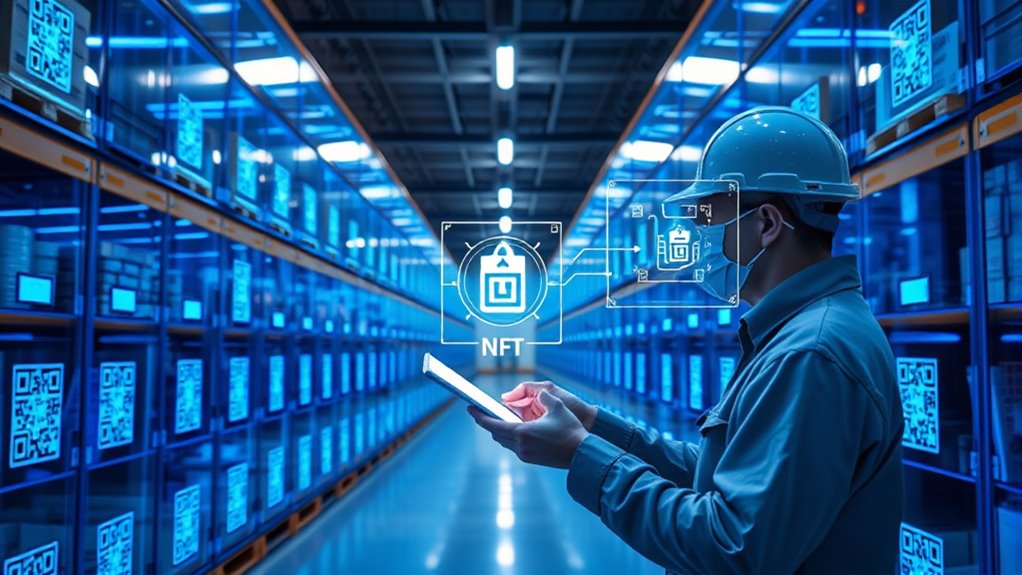NFTs are transforming supply chains by offering secure, tamper-proof records that verify product authenticity and provenance. You can track products throughout their journey—from manufacturing to retail—using NFTs embedded with essential information. This creates transparent, immutable records that prevent counterfeiting and streamline audits. By adopting NFTs, supply chains improve efficiency and trust. If you want to discover how you’re already part of this evolving technology, keep exploring the possibilities ahead.
Key Takeaways
- NFTs create tamper-proof digital records of product ownership and provenance throughout the supply chain.
- They enable instant verification of product authenticity at each stage, reducing counterfeiting risks.
- Blockchain-based NFTs provide an immutable, transparent audit trail for tracking product movement and handling.
- Embedding product data in NFTs streamlines documentation, audits, and recall processes, improving supply chain efficiency.
- They support compliance, security, and consumer trust by ensuring product integrity from manufacturing to retail.

While most people associate NFTs primarily with digital art, their potential extends far beyond that domain. As you explore their applications in supply chains, you’ll see how NFTs can revolutionize the way products are tracked and verified. One of the key benefits of using NFTs in this context is their ability to establish clear digital ownership. When a product is linked to an NFT, it provides a tamper-proof record that proves who owns or has owned the item at each stage of its journey. This digital ownership detail is essential for preventing fraud, counterfeiting, and ensuring that consumers receive authentic products. By attaching an NFT to an item, you create a transparent, unchangeable ledger that everyone involved can trust.
NFTs establish tamper-proof digital ownership, enabling transparent, trustworthy tracking of products throughout their supply chain journey.
Authenticity verification becomes more straightforward and reliable with NFTs. When a product moves through various checkpoints—manufacturing, shipping, retail—you can update its corresponding NFT to reflect each step. This process enables you and other stakeholders to verify the product’s origin and integrity instantly. For example, a luxury brand might assign an NFT to each handbag, allowing buyers to verify that it’s genuine before purchase. Because NFTs are stored on secure, decentralized blockchains, they cannot be altered or forged easily. This security feature ensures that the product’s authenticity can be verified at any point, giving you confidence in the item’s provenance.
Implementing NFTs in supply chains also enhances transparency. Every transaction linked to an NFT is recorded on the blockchain, creating an immutable audit trail. As you follow a product’s lifecycle, you can see where it’s been, when it was shipped, and who handled it. This level of traceability is especially valuable for perishable goods, pharmaceuticals, or high-value items, where knowing the product’s history is critical. It reduces the risk of counterfeit products entering the market and helps brands demonstrate compliance with safety and quality standards. Additionally, the use of blockchain technology supports AI security efforts by providing a tamper-proof record that can be monitored for suspicious activity.
Furthermore, NFTs streamline the documentation process. Traditionally, verifying a product’s history involves sifting through paper records or multiple digital systems, which can be slow and prone to errors. With NFTs, all relevant information is embedded in a single, easily accessible record. This simplifies audits and recalls, enabling faster responses when issues arise. As you adopt NFTs in your supply chain, you’ll find that they offer a reliable, efficient way to maintain digital ownership and verify authenticity at every stage, ultimately increasing trust among consumers and partners alike.
Frequently Asked Questions
How Do NFTS Improve Supply Chain Transparency?
You can see how NFTs improve supply chain transparency by providing digital authentication and provenance tracking. When you use NFTs, each product’s journey is securely recorded on the blockchain, making it easy to verify its origin and authenticity. This helps prevent fraud, ensures compliance, and builds trust with consumers. By leveraging NFTs, you gain real-time visibility into the product lifecycle, making supply chains more transparent, efficient, and trustworthy.
What Types of Products Benefit Most From NFT Traceability?
They say “you are what you eat,” and that’s especially true with perishable foods and luxury goods. You, as a consumer, benefit most when these products use NFTs for traceability, ensuring quality and authenticity. Luxury items like designer handbags or rare wines, and perishable foods such as seafood or organic produce, gain transparency. This technology helps you trust your purchase, knowing its journey from origin to shelf is clear and verifiable.
Are There Legal Challenges to Using NFTS in Supply Chains?
You might wonder if legal challenges could hinder using NFTs in supply chains. Yes, issues around intellectual property rights and regulatory compliance can pose hurdles. You’ll need to guarantee that NFTs accurately represent product data and respect existing IP laws. Regulatory frameworks are still evolving, so staying informed and working with legal experts helps you navigate potential legal risks and ensure your NFT implementation aligns with applicable laws.
How Secure Are NFTS Against Counterfeiting and Fraud?
Think of NFTs like digital safes with unbreakable locks. They use strong encryption protocols and digital signatures, making counterfeiting nearly impossible. For example, a luxury watch brand uses NFTs to verify authenticity, preventing fake copies. While no system is entirely foolproof, these security measures substantially reduce fraud risks, giving you confidence in supply chain traceability and authentic products.
What Are the Costs Involved in Implementing NFT Tracking Systems?
When considering NFT tracking systems, you should do a thorough cost analysis to understand the expenses involved. The costs include technology investment in blockchain infrastructure, developing or integrating software, and ongoing maintenance. You might also face expenses related to staff training and security measures. While initial costs can be high, the improved traceability and transparency can lead to long-term savings and enhanced supply chain integrity.
Conclusion
As you explore NFTs beyond art, you realize they’re like the threads weaving a resilient tapestry of transparency in supply chains. These digital tokens serve as unbreakable links, ensuring authenticity and traceability at every step. By embracing this technology, you’re not just adding a layer of security—you’re strengthening the fabric of trust that holds industries together. In this evolving landscape, NFTs become the compass guiding you toward a more transparent, accountable future.










